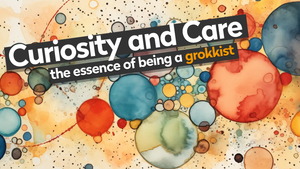My younger daughter had just reached seven, and suddenly the two girls started watching certain movies on repeat. Having selected one, they (and their long-suffering parents) got to know it by heart.
It began with Julie Andrews and The Sound of Music. The girls really enjoyed the slower pace of early movies like Mary Poppins, but The Sound of Music became their favourite. I lost count of how many times I saw that – Von Trapped in an endless loop over a period of perhaps six months. And then they moved on to Pollyanna.
If The Sound of Music had good tunes, Pollyanna had good characters – complex characters. And it carried a moral that I recognised. The central thrust of the movie is the heroine’s determination to find the good in people, even the downright rude and cantankerous ones. I recognised this as being close to a commonly quoted text from Quakerism.
George Fox, who founded Quakerism, stated that one should “walk cheerfully over the world answering to that of God in every one…”
Exactly what Fox intended by this is debatable. Words change meaning over time. But most modern Quakers read this text as a discrete moral injunction to respond to the good in people, and it has certainly been helpful to me in that way.
When relating to others, you have a choice. You can demand perfection of them and then focus on how they fail to meet it, or you can put aside any expectations and focus on what is good.
You can demand perfection of them and then focus on how they fail to meet it, or you can put aside any expectations and focus on what is good.
In dealing with other people, I try, like Pollyanna, to do the latter. When scrutinising myself, it’s usually the former. I am a perfectionist and therefore beat myself up about my own failings. But that is not a great way to deal with someone else.
I first gained an understanding of this dichotomy when, in 1983, I heard a talk by a protester from Greenham Common.
The Greenham Common Women’s Peace Camp was a long-running feminist demonstration against the presence of nuclear missiles in Britain, where women camped outside the American army base at Greenham Common to protest.
I fully supported the cause but had hitherto found the protesters I encountered to be rather unsympathetic. If the right’s weakness is selfishness, then the left’s is self-righteousness, and anyone appearing less than 100% committed to the cause on their terms was given short shrift. If cancel culture had been available back then, it would have been utilised very fast.
The protester I heard (and I have since lost my notes so cannot pass on her name) was very different. She had got tired, she said, of people shutting down as soon as she tried to talk to them about nuclear disarmament, and she had realised that this was because she had been coming to the conversation purely from her own perspective.
Yet, whenever she encountered someone new (at the bus stop, for example) they had their own preoccupations and prejudices, and these needed to be acknowledged. You needed to build a genuine rapport with someone before you could get into a political discussion. Hence it was important to acknowledge and work within their own frameworks first.
The discussion, in other words, should not be one of trying to get a sinner to repent their sins, but one of looking for common ground and then going on a journey together. It was all about finding the good in the other person so that you could appeal to it.
It was all about finding the good in the other person so that you could appeal to it.
There is another facet to this, too. A genuine conversation can only happen if you acknowledge the possibility that you, yourself, may be mistaken.
This is hard when you feel you are promoting a righteous cause, but if you are not open to your own fallibility, then any conversation is going to be perceived as an attempt to one-up your opponent and impose your own will. Strangely, people tend to resent rather than respect this. Perfection may be a worthy goal, but claiming it for yourself is tiresome.
I have struggled with perfectionism for much of my life. It is a hard taskmaster. In many ways it is like a black hole that sucks everything into it and allows nothing, especially joy, to escape. It means you are never happy with anything you do.
Admittedly, self-satisfaction is not a desirable trait either, and perfectionism does at least ensure that people force themselves to improve. But you have no idea how liberating it was when I decided that I was going to allow myself to be happy if I achieved 95% of perfection, rather than 100%.
Giving myself just that little bit of slack made such a difference. I was finally being mildly generous with myself.
In the light of this, I now try to be a great deal more generous towards others – starting by giving them the benefit of the doubt and looking for the good in them. Sometimes this is hard. Right now, I seem to be getting a lot of practice in digging far beyond the surface to find any signs of it.
To avoid giving up in such situations, I use the mnemonic, Pollyanna. It snaps me out of being judgemental and puts me back into the process of responding to people’s better nature.
My daughters still remember Pollyanna, and I hope it carries similar connotations for them. Granted, their movie journey moved on from the moral certainties of Pollyanna to the decidedly less morally certain Grease, but hopefully something of the former stuck. It would be nice if the hours I spent watching those movies, day after day after day, at least provided some benefit for them. I hope so.

Each vignette invites readers to embrace the beauty of unfinished thinking and the art of holding life’s ongoing questions.











Member discussion